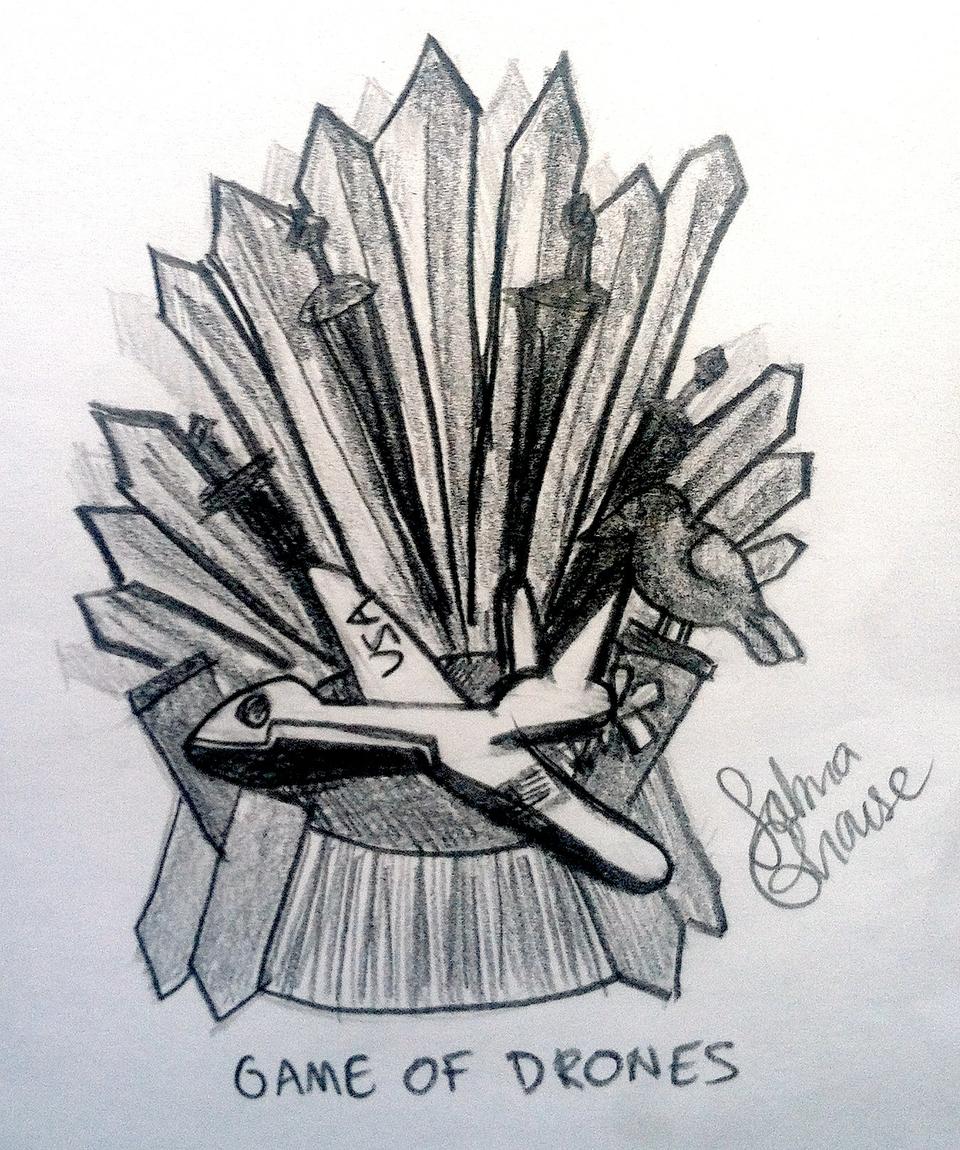
News
Summers Will Not Finish Semester of Teaching as Harvard Investigates Epstein Ties

News
Harvard College Students Report Favoring Divestment from Israel in HUA Survey

News
‘He Should Resign’: Harvard Undergrads Take Hard Line Against Summers Over Epstein Scandal

News
Harvard To Launch New Investigation Into Epstein’s Ties to Summers, Other University Affiliates

News
Harvard Students To Vote on Divestment From Israel in Inaugural HUA Election Survey
Game of Drones
Obama is a greater threat to civil liberties than Bush could have ever been

It is troubling when what was once macabre metaphor leaps into reality. The Bard eerily foretold the drone debacle some four centuries ago, when, in King John, Phillip Falconbridge imagines that, “some airy devil hovers in the sky and pours down mischief.” And death.
President Obama, flagrantly trampling over campaign promises to “usher in a new era of open government,” is comfortable constructing a misinformation machine of Orwellian proportions. Any other country maintaining a policy of outright disavowal of hundreds of secret strikes, keeping a classified kill list that includes teenagers, and assassinating its own citizens without trial would have long ago been condemned by the U.S. as undemocratic and totalitarian. Hell, America might have even invaded it by now.
But surely, in light of national security concerns, my characterization of the administration’s policies as Orwellian is facile and hyperbolic? It’s not.
American officials artificially deflate civilian casualty counts in “signature” strikes by conveniently redefining combatant to mean anyone displaying suspicious intelligence signatures. In the words of the former US ambassador to Pakistan, Cameron P. Munter, “the definition of someone who can be targeted…is a male between the ages of 20 and 40.”
Redefining combatant to include anyone within the vicinity of a drone strike is pure doublethink: “Signature strike” is only the latest continuation of a shameful American tradition of corroding the English lexicon for political gain with disingenuous euphemisms like “enhanced interrogation” and “separate but equal.”
The deliberate duplicity of American intelligence agencies, or paramilitary, to be more accurate, led Senator Diane Feinstein, chair of the Senate Intelligence Committee, to make the absurd assertion that the civilian casualties from drone strikes “each year has typically been in the single digits”—in direct contradiction with multiple independent researchers like the Human Rights Institute at Columbia Law School, which puts the body count of innocents in the hundreds.
Discounting its uncertain legal standing for the moment, the drone program is of dubious efficacy. What of the precedent set for international intervention with unmanned aerial vehicles for countries like Iran and China, the ill will caused by the killing of Pakistanis with mothers, fathers, and families, and the severe distrust in government by the citizens of Yemen, Pakistan, and Somalia, where leaders seem impotent and uncaring for allowing another country to run amok over sacred sovereignty?
Whatever gains made by the entire drone program in Pakistan are fruits of the poisonous tree—the result of a corrupt back-room deal in 2004. In exchange for America’s assassination of an inconvenient Taliban militant, weak-willed Pakistani President Pervez Musharraf gave license for the covert drone program that would go on to kill thousands.
It’s not that I have some superstitious mistrust of aerial weapons—only mistrust for an opaque military program, governed by either nonexistent or secret law, that trusts anonymous, high-level bureaucrats with the power to kill American citizens without a trial.
And it wasn’t long before the drone program metastasized into just that: the targeted killings of American citizens abroad without trials, in violation of the Fourth Amendment. A recently revealed, disturbing Harry Kissinger quip rings too truly: “The illegal we do immediately; the unconstitutional takes a little longer.”
When President Obama allowed for the targeted killing of Anwar Al-Awlaki, the American imam turned Al-Qaeda propagandist operating from Yemen, in a drone strike in 2011 that also killed another American, Samir Khan, he radically claimed powers for the executive that seemed more in line with the troubled Bush era than Obama’s previous professorship of constitutional law.
A separate drone strike killed Al-Awlaki’s sixteen-year-old son, also an American citizen, two weeks later. When asked about the troubling trend, then Press Secretary Robert Gibbs glibly and self-assuredly suggested that the slain adolescent “should have [had] a far more responsible father.”
Nonsensically, the U.S. government currently requires a warrant signed by a judge to search a car or tap a phone (theoretically, anyway) but there is absolutely no judicial oversight of the drone program, and the Department of Justice asserted in a leaked white paper that it has the authority to kill U.S. citizens.
President Obama’s recent nomination of John O. Brennan as the director of the CIA points to an administration that is not only intent on continuing murky drone operations without judicial oversight, but a willful blindness towards the horrendous torture culture of the CIA allowed under President Bush while Brennan was a senior official. Obama has consistently refused to consider prosecution of torturers, and the woman directly responsible for the controversial and illegal destruction of interrogation tapes has been promoted instead of dismissed.
Despite all its soaring rhetoric on moving past war and torture, the Obama administration seems less concerned with civil liberties than even the Bush administration. That the capital “D” next to his name seems to silence criticism from fellow lawmakers makes him more dangerous than Bush ever was.
Idrees Kahloon ’16 is a Crimson editorial writer in Weld Hall. His column appears on alternate Wednesdays. Follow him on Twitter @ikahloon
Want to keep up with breaking news? Subscribe to our email newsletter.
